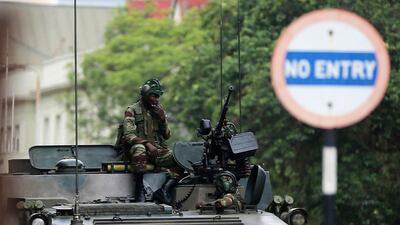Zimbabwean President Robert Mugabe has held direct talks with the leader of a group of generals who put him under house arrest and is urging him to end his 37-year rule of the southern African nation.
The state-owned Zimbabwe Herald newspaper published photographs on Thursday showing Mr Mugabe, 93, meeting with armed forces commander Constantino Chiwenga at State House, saying details were to come. Father Fidelis Mukonori, a prominent Catholic priest, is mediating the talks, which include officials from neighboring South Africa.
The photos did not show first lady, Grace Mugabe, whose rapid political rise had alarmed many in the country who feared she could succeed her husband.
Meanwhile, seizing on the political limbo to speak out, civil society groups and opposition leaders urged Mr Mugabe to step aside after decades in power and for the country to transition into free and fair elections.
The president has been in military custody, reportedly with his wife, since the army seized power overnight on Tuesday. There was no sign on Thursday of former vice president Emmerson Mnangagwa, whose firing last week angered supporters in the military amid widespread concern that the unpopular Ms Mugabe would take his place.
The UN Secretary-General Antonio Guterres said on Thursday that he was closely following developments in Zimbabwe and appealed for a peaceful solution to the crisis.
________________
Read more:
The disastrous rule of Robert Mugabe
Robert Mugabe through the years — in pictures
WHO chief reverses Mugabe ambassador appointment
________________
The military remained in the streets of the capital, Harare, on Thursday. Southern African regional officials were meeting in neighbouring Botswana on the crisis.
A joint statement by more than 100 civil society groups urged Mr Mugabe, the world's oldest head of state, to peacefully step aside and asked the military to respect the constitution. A joint statement by churches also appealed for calm.
One analyst said he believed the negotiations "have pretty much reached an end point" to get Mr Mugabe to step aside and that it was a "matter of hours or days".
Knox Chitiyo, associate fellow with the Africa programme at Chatham House, warned that speculation remains high but said the military wants a dignified exit for Mr Mugabe, who has ruled since independence from white minority rule in 1980 and is still seen by some in Africa as a liberation leader.
Mr Chitiyo said he did not know where the ailing Mugabe would go but that the destination would "likely [be] driven by his health". Mr Mugabe routinely seeks medical treatment in Singapore.
Opposition leaders spoke out but said they had not been contacted as part of the negotiations with Mr Mugabe.
Opposition leader Morgan Tsvangirai, who shared power with Mr Mugabe between 2009 and 2013, said the president must resign and that his party would participate in talks on a transitional mechanism if approached.
A vice president who was fired in 2014, Joice Mujuru, called for "free, fair and credible elections" following a transition arrangement that draws from a range of communities.
Evan Mawarire, the pastor whose #ThisFlag social media campaign last year led to the largest anti-government protests in a decade, asked: "Should we just sit and wait or shall we at least be part of this transition process?"
Across the country on Thursday, Zimbabweans long frustrated by crackdowns on dissent and a collapsing economy were enjoying freedoms they hadn't had in years. For once, they weren't contending with bribe-seeking police officers who mounted roadblocks every few kilometres.
Soldiers manning the few checkpoints leading into downtown Harare greeted motorists with a smile, searching cars without hostilities and wishing motorists a safe journey.
Street vendors who endured police raids after Mr Mugabe ordered their removal were working without hassles. Meanwhile, trade unions urged workers to go about their business.
"The situation is quite OK because they are now returning to their jobs," said one resident, Clinton Mandioper.
Human rights groups urged respect for rights as the drama played out.
Amid questions about the whereabouts of Ms Mugabe, one Namibian newspaper, the New Era, reported that the country's foreign minister denied she had fled there.
The US embassy advised citizens in Zimbabwe to "limit unnecessary movements" as political uncertainty continues. The British government also urged its citizens to avoid large gatherings and any demonstrations.

